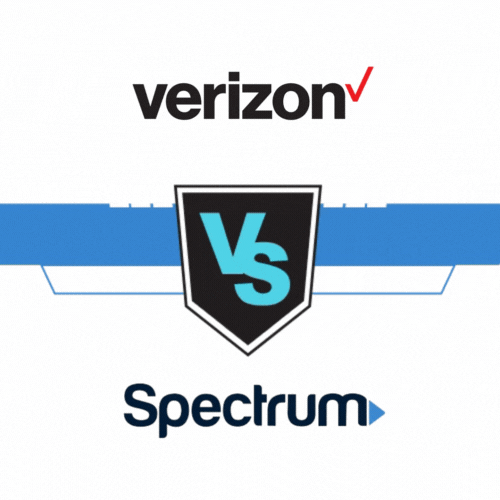CenturyLink vs. Spectrum: Choosing the Best ISP for Your Needs

Introduction In today’s digital age, access to reliable internet is essential for both personal and professional endeavors. Two prominent players in the internet service provider (ISP) market, CenturyLink and Spectrum, offer a range of services tailored to meet diverse consumer needs. Understanding the differences, pros, and cons of each provider is crucial for making an informed decision when selecting an ISP. Network Infrastructure and Coverage CenturyLink CenturyLink boasts a robust network infrastructure encompassing a blend of fiber-optic and DSL technologies. This extensive network spans urban centers and reaches into rural areas, providing internet access to a wide spectrum of consumers. While CenturyLink’s fiber-optic connections deliver high-speed internet, availability may be limited in certain regions, where DSL remains the primary mode of service delivery. Compare CenturyLink and Spectrum to find the best ISP for your needs. Explore network coverage, speed, pricing, and customer service. Spectrum Spectrum relies on its cable network infrastructure to deliver internet services to customers across the United States. With a focus on urban and suburban areas, Spectrum offers broad coverage and consistent connectivity. However, like CenturyLink, coverage in rural or remote locations may be less comprehensive compared to urban areas. Speed and Performance CenturyLink One of CenturyLink’s key selling points is its range of internet speed options, catering to varying consumer needs. Customers can choose from a spectrum of speeds, with fiber-optic connections offering blazing-fast performance ideal for bandwidth-intensive activities such as HD streaming and online gaming. However, in areas where only DSL is available, speeds may be more modest, especially during peak usage times. Spectrum Spectrum prides itself on delivering fast and consistent speeds to its subscribers. With its cable internet technology, Spectrum offers competitive download and upload speeds suitable for a variety of online activities. While speeds may vary depending on factors such as network congestion and distance from the nearest access point, Spectrum’s overall performance garners positive reviews from customers. Service Plans and Pricing CenturyLink CenturyLink offers a diverse range of service plans designed to accommodate different usage patterns and budgetary constraints. From basic internet packages suitable for light browsing to premium plans tailored for heavy-duty users, CenturyLink provides flexibility and choice. Additionally, bundling options with TV and phone services may be available, allowing customers to customize their packages according to their preferences. Spectrum Similarly, Spectrum offers a variety of service plans to meet the needs of its diverse customer base. With options for standalone internet access or bundled services including TV and voice, Spectrum caters to a wide range of users. While promotional pricing and introductory offers may make Spectrum an attractive option for budget-conscious consumers, it’s essential to consider long-term pricing and contract terms when evaluating the overall value proposition. Customer Service and Support CenturyLink Customer service and support are integral aspects of the CenturyLink experience. With a dedicated team of representatives available via phone, chat, or email, CenturyLink aims to provide timely assistance and resolution to customer inquiries and technical issues. Additionally, online resources such as FAQs, troubleshooting guides, and community forums empower customers to troubleshoot common issues independently. Spectrum Spectrum prioritizes customer satisfaction and strives to deliver exceptional support across multiple channels. Whether contacting support via phone, online chat, or in-person at one of their retail locations, Spectrum customers can expect prompt and courteous assistance from knowledgeable representatives. Moreover, the Spectrum website offers a wealth of self-help resources, including tutorials, setup guides, and troubleshooting tips. Pros and Cons of CenturyLink Pros – Reliable Connectivity: CenturyLink’s extensive network infrastructure ensures reliable connectivity, even in remote areas. – Flexible Service Plans: CenturyLink offers a variety of service plans to accommodate different needs and budgets. – Quality Customer Service: CenturyLink’s dedicated customer support team provides timely assistance and resolution to customer inquiries. Cons – Limited Fiber Optic Availability: In some regions, availability of CenturyLink’s high-speed fiber-optic connections may be limited. – Speed Variability: Speeds may vary with CenturyLink’s DSL connections, particularly during peak usage times. Pros and Cons of Spectrum Pros – Wide Coverage: Spectrum’s cable network infrastructure offers broad coverage, reaching urban and suburban areas. – Competitive Pricing: Spectrum’s service plans are competitively priced, making them an attractive option for budget-conscious consumers. – Convenient Support Options: Spectrum provides multiple channels for customer support, including phone, online chat, and in-person assistance. Cons – Limited Rural Coverage: Spectrum’s coverage may be less comprehensive in rural or remote areas compared to urban centers. – Contract Terms: Spectrum’s service plans may come with long-term contracts and early termination fees, which could be a drawback for some consumers. Comparison and Conclusion When comparing CenturyLink and Spectrum, it’s essential to consider factors such as network infrastructure, speed and performance, service plans and pricing, and customer service and support. While both ISPs have their strengths and weaknesses, the ideal choice depends on individual preferences, location, and budget. CenturyLink’s widespread DSL coverage and fiber-optic offerings appeal to those seeking reliable connectivity, while Spectrum’s robust cable network and competitive pricing make it a compelling option for many consumers. Ultimately, conducting thorough research and weighing the pros and cons of each provider will empower you to make an informed decision that aligns with your connectivity needs. Conclusion In conclusion, CenturyLink and Spectrum are two prominent ISPs offering a range of services to meet the diverse needs of consumers. By understanding the differences, pros, and cons of each provider, you can make an informed decision when selecting an ISP. Whether you prioritize speed, coverage, pricing, or customer service, evaluating these factors will help you choose the ISP that best fits your requirements. FAQs 1. Which ISP offers faster internet speeds, CenturyLink or Spectrum? CenturyLink typically offers faster speeds with its fiber-optic connections, but availability may be limited in certain areas. Spectrum’s cable internet technology also delivers competitive speeds, making it a suitable choice for many consumers. 2. Are there any data caps with CenturyLink or Spectrum? Both CenturyLink and Spectrum may impose data caps on certain service plans. It’s essential to review the terms of your chosen plan to understand any limitations on data usage. 3. Can I bundle TV and phone
Exploring the Wonders of Satellite Internet

Understanding Satellite Internet Technology In today’s fast-paced digital world, reliable internet access is no longer a luxury, but a necessity. However, for those residing in remote or underserved areas, traditional broadband options like cable or fiber might be unavailable. This is where satellite internet emerges as a revolutionary technology, offering a lifeline to the digital world. Satellite internet utilizes a network of high-powered communication satellites strategically positioned in space. Unlike traditional options that rely on physical cables or wires, satellite internet transmits data signals through radio waves, making it independent of ground infrastructure limitations. This ingenious technology ensures reliable connectivity for users regardless of their geographical location, be it a remote mountain cabin, a sprawling ranch, or a tropical island paradise. Demystifying the Process: How Satellite Internet Works The magic of satellite internet lies in its intricate dance between satellites orbiting Earth and user-installed equipment. Here’s a breakdown of the process: Beyond Coverage: Advantages of Satellite Internet While global coverage is undoubtedly a key advantage of satellite internet, its benefits extend far beyond reaching remote locations. Here’s a closer look at what makes satellite internet a compelling choice: Choosing the Right Satellite Internet Provider: A Guide With a growing number of satellite internet providers vying for your attention, selecting the best one can be overwhelming. Here are some key factors to consider when making your decision: Conclusion Satellite internet technology has revolutionized the way we access information and connect with the world. By bridging the digital divide and offering high-speed internet access to far-flung locations, satellite internet empowers individuals and communities to participate in the digital age. With a clear understanding of how satellite internet works and by carefully choosing the right provider, users can reap the benefits of reliable and high-speed internet connectivity regardless of their geographical location.
Verizon 5G Home Internet vs Spectrum Fiber Optic Internet: Exploring the Speed Difference and Equipment

A Comprehensive Analysis of Internet Choices In today’s digital era, access to high-speed internet is indispensable for various facets of modern life, spanning from streaming movies and online gaming to remote work and virtual meetings. Two prominent players in the high-speed internet domain are Verizon 5G Home Internet and Spectrum Fiber Optic Internet. While both offer commendable speeds and reliable connectivity, they diverge in certain aspects, including technology, equipment, and availability. Let’s delve into each option to grasp their distinct features and advantages. Verizon 5G Home Internet: Unrivaled Speed and Innovation Speed Benchmark: Verizon 5G Home Internet epitomizes speed and innovation, leveraging 5G technology to deliver unmatched connectivity. With speeds soaring up to 1 Gbps (or 1000 Mbps), Verizon’s 5G service sets the gold standard for high-speed internet, enabling users to stream, download, and browse with lightning-fast efficiency. Imagine downloading an entire high-definition movie in seconds or seamlessly participating in a video conference without any lag or buffering interruptions. Equipment Requirements: Accessing Verizon 5G Home Internet necessitates a specialized router tailored to harness the full potential of 5G technology. Verizon provides this state-of-the-art equipment as part of its service package, ensuring customers are equipped for a smooth and hassle-free setup. For instance, envision a suburban family upgrading to Verizon 5G Home Internet and receiving a cutting-edge router that significantly enhances their online experience. Availability and Expansion: While Verizon 5G Home Internet may not yet be available in all areas, the company actively expands its coverage footprint to bring high-speed 5G service to more communities nationwide. Through ongoing investments in infrastructure and network expansion endeavors, Verizon endeavors to bridge the digital gap, providing reliable, high-speed internet access to households and businesses across the country. Envision a scenario where a rural town gains access to Verizon’s 5G service for the first time, revolutionizing residents’ online connections and communications. Spectrum Fiber Optic Internet: Dependable Connectivity and Steady Speeds Speed Consistency: Spectrum Fiber Optic Internet emerges as another formidable contender in the high-speed internet arena, delivering dependable connectivity and consistent speeds. While it may not match the blazing velocities of Verizon’s 5G service, Spectrum Fiber Optic Internet offers impressive speeds of up to 940 Mbps. This ensures smooth and uninterrupted online experiences, even during peak usage hours when multiple devices are concurrently in use. For instance, envision a household with numerous family members streaming movies, gaming online, and engaging in video conferencing without encountering any slowdowns or interruptions. Equipment Prerequisites: Subscribers to Spectrum Fiber Optic Internet receive a top-of-the-line modem and router explicitly designed to capitalize on fiber optic technology’s benefits. These advanced devices are optimized to deliver consistent and reliable internet connectivity, enabling users to enjoy seamless browsing, streaming, and gaming experiences without disruptions. Spectrum also provides professional installation services to ensure optimal setup and performance. Ponder a scenario where a small business upgrades to Spectrum Fiber Optic Internet and receives expert installation services to maximize their internet connection’s efficiency. Availability and Expansion: Spectrum continues to expand its fiber optic internet infrastructure, gradually extending coverage to new areas and communities. Through ongoing network enhancements and expansion initiatives, Spectrum aims to provide more households and businesses with access to its high-speed fiber optic internet service, enhancing connectivity and digital access nationwide. Envision a scenario where a suburban neighborhood gains access to Spectrum’s fiber optic service, empowering residents with reliable and high-speed internet for all their digital requirements. Deciphering Speed Variance and Equipment Between Verizon 5G Home Internet and Spectrum Fiber Optic Internet. Gain insights into their speeds, equipment necessities, availability, and make an informed decision for your high-speed internet needs. Speed Comparison: Deciphering the Differences The primary distinction between Verizon 5G Home Internet and Spectrum Fiber Optic Internet lies in speed. While Verizon’s 5G service offers unparalleled speeds of up to 1 Gbps, Spectrum Fiber Optic Internet delivers impressive speeds of up to 940 Mbps. While Verizon’s 5G technology showcases cutting-edge innovation and potential for even faster speeds in the future, Spectrum’s fiber optic service offers reliable and consistent performance for households and businesses alike. Making an Informed Decision In conclusion, both Verizon 5G Home Internet and Spectrum Fiber Optic Internet provide high-speed connectivity and reliability, catering to diverse consumer needs. If prioritizing blazing-fast speeds and cutting-edge technology, Verizon’s 5G service may be the preferred choice. However, if valuing consistent and dependable internet performance, Spectrum’s fiber optic service presents a compelling option. Ultimately, the selection between the two depends on individual preferences, coverage availability, and specific internet requirements. FAQs about Verizon 5G Home Internet vs Spectrum Fiber Optic Internet
